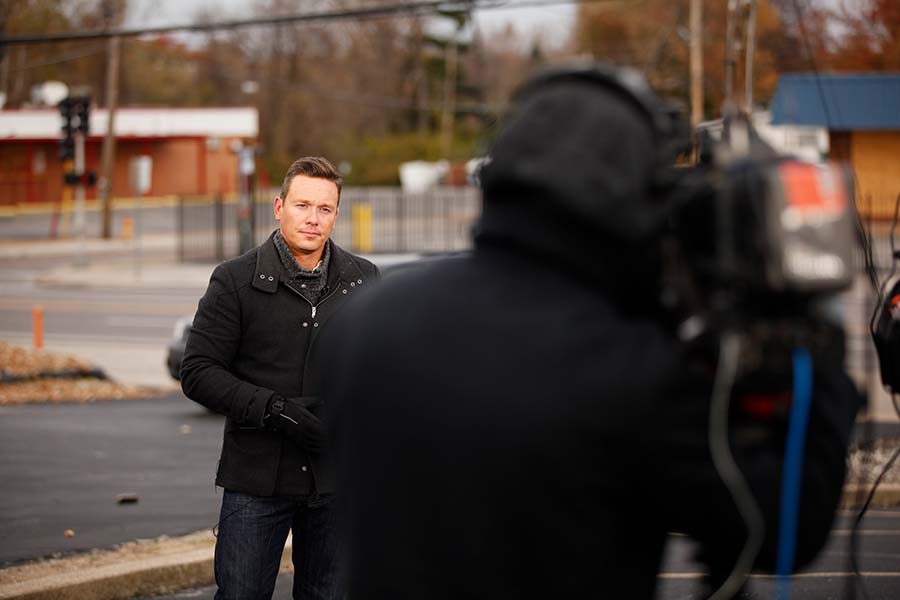During the 2014 Ferguson, Missouri riots in the U.S. after the fatal police shooting of Michael Brown, only one news presenter bothered to ask a protester why they were burning down their own buildings.
Benn Swann (pictured above), founder of the Truth In Media project, believes that many media outlets are not interested in telling the truth, and are too guided by business and political interests behind the scenes.
Picking on mostly controversial topics, the two-time Emmy Award winner believes in digging deep and asking uncomfortable questions. He believes that journalism in its purest form is a higher calling and at its worst is nothing more than propaganda and a distraction for the masses.
He’s been a reporter, photographer, bureau chief and anchor for KFOX-TV, Fox 19 News and RT. Now an independent news reporter, Swann has adopted social media and online video, including Netflix and Hulu, to get his message out. His 10 million views in 140 countries indicate there must be some truth in what he does. He spoke to us about what is wrong with the news and how it’s being reinvented.
Is Internet broadcasting the future of news?
Absolutely, I don’t think it’s the future of just news; it’s the future of all media. Eventually we’re going to see a convergence of television and cinema. I think most of the traditional TV broadcast news stations around the U.S. realize that’s happening as they’re watching their viewer numbers drop every year. Cable news knows it’s happening; they haven’t seen growth in around 12 years. No one’s really sure about what it will become over time, though.
Because of the acquisition of so many different media types and their bundling into just one or two corporations, I think there’s a danger of seeing online media becoming limited. We’re going to see some major shifts around who’s posting content and how viewers, listeners and readers are able to access that content. The future of the Internet is very unclear and might unfortunately become what the big media companies decide to do in this space.
Social media has a huge influence on how we receive our news. How are you approaching social media in a unique way?
In the past, media outlets essentially created content with a shotgun approach to try and hit as many people as possible that might be interested. With social media, you can target groups of people who have already expressed interest in certain subjects, and in very specific geographic areas.
To what extent should governments and large corporations dictate what we hear and see?
It’s more a question of what you do about the fact that they do control what we hear and see. I don’t have a problem with governments putting information out to people because governments also have a point of view and access to information that the rest of us don’t have. My issue is when there is collusion between governments and media organizations to frame or shape a story. Throughout history, governments have engaged in some form of propaganda but that doesn’t mean it’s always a bad thing. Unfortunately the term suggests that it’s all negative but it’s not always bad when a government expresses itself or tries to inform the public about something.
Are the people who foot the bill the people who dictate the agenda of the news we hear? What alternatives are there?
We have sponsors who pay for some of the work we do and I have no problem with that. Someone has to pay for all of it, whether it’s a government, corporation or advertiser who places its products on your channel. They obviously have a focused point of view that protects and builds their brand. For example, an apparel company is not going to pay to create content around sweatshops that may be associated with them, so the challenge for media outlets is how independent they’re prepared to be.
A solution is to have transparency about who owns news corporations, who is connected to these media entities and the influence they have.
When you do a story, how do you approach it in a way that is as open-minded and balanced as possible?
Many times you hear people use the word balance. Fox News is responsible for how many Americans use this word because they see “balanced” as getting someone from the left and someone from the right and hearing both sides of the story. Both sides of the story is a disingenuous phrase because it indicates that there are only two sides to a story when virtually every story has multiple sides.
We have a slogan “humanity is greater than politics” and with every story we do we look at how people are being affected. You can find 10 different individuals who are affected in 10 different ways and those are all truths. One is not more truthful than the other.
How do you choose your stories, what type of criteria do you use for that?
We don’t follow what other news channels are doing. We also look at bringing clarity to stories that we consider misrepresented because the story has become trapped in that left-right paradigm that I mentioned earlier. We believe strongly in activism but not necessarily for us to direct it, which some media platforms try and do. We’re not trying to control how people become activated; we just want them to become activated
in some way.

What is your opinion on Julian Assange and the other whistleblowers that have exposed secure information? Is this treason or transparency?
I certainly don’t see it as treason. I believe that whistleblowers are some of the most important people in any society because their role should be to hold governments accountable. The problem is that there’s such a disconnect between the government and the citizenry and between the rights of the individual, media and government. This has resulted in most media treating whistleblowers as if they are terrible people or traitors. What Wikileaks did was open up an entire generation of people around the world to the idea that you don’t need gatekeepers in media to get information anymore.
How do you make this profitable? There’s so much free information available online – how do you turn this into a sustainable business model?
Part of the struggle is finding a foothold that becomes financially viable within the context of traditional channels of media. As much as we can micro-target and reach people easily online, one of the difficulties is finding advertisers who want to connect with it.
We’re connecting with some traditional media channels to raise our value online, because even though everything is shifting online, we’ve still got a long way to go before all the advertising dollars follow.
People have been trained to view traditional media as being more legitimate, even thought most people don’t watch or read it. If there’s a story that runs in The New York Times, it’s considered more legitimate than if it was found elsewhere. It’s a strange paradigm to try and break through.
Who inspires you?
U.S. lawyer, journalist and author Glenn Greenwald has done some great work on civil liberties. Despite hearing some negative personal things about Julian Assange of Wikileaks, I don’t think any of that matters. I think you need to look at the fact that he figured out a way that was bigger than himself to change the way people receive information. I’m very inspired by that.




































